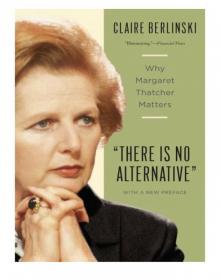- Home
- Claire Berlinski
Loose Lips Page 10
Loose Lips Read online
Page 10
I held up a hand to silence her; I was afraid she would go on like that all day. “I get it, I get it. You’re suffering for beauty. It’s noble.”
But Stan was losing weight—quickly. He was starving himself, and he was doing it for me. He had lost ten pounds already. Every day, he ate a little green salad with sunflower seeds for lunch, and every night I saw him lumber off to the gym. No one had ever done that for me before.
Stan had never known his real father. The man had abandoned his mother when he discovered she was pregnant. Stan and his mother had only discussed his father twice in his life. She told Stan that his appearance was hauntingly similar to his father’s. “You’re the spitting image of him,” she said. Stan believed that his natural father had been an Air America pilot. “When my mother told me what he did, I knew it had to be Air America—she didn’t know what that was, and I didn’t tell her—she just knew he’d flown planes over Laos.” Stan’s mother had worked as a secretary to support him, and when Stan was a toddler, she married an upright man, who adopted her illegitimate child. Stan said his mother married “because she wanted to give me a name.”
“Her own name wasn’t good enough?” I asked.
“I come from an old-fashioned town. It’s so small that the only place to go out at night is the ice cream parlor, and even that closes at nine. When I was growing up, we got excited about the state fair. It was the most interesting thing that happened all year.”
State fairs were as far from my childhood as the running of the bulls in Pamplona. My mother was a curator at the Metropolitan Museum of Art. To her parents’ horror, she’d fallen in love with a shiftless cabdriver who played bass in a band called the Baloney Ponies. My father, unlike me, was an ace of a driver. A fare once dashed up to his cab and promised him a fifty-dollar tip if he could get to LaGuardia Airport in fifteen minutes. They were there in less than twelve, but the fare dropped dead of a heart attack. Another piece of family lore had it that a Japanese tourist had arrived at the taxi stand at LaGuardia asking for a ride to Kennedy. My father threw his luggage in the trunk, told him to get in, and circled the airport three times. He dropped him off exactly where he’d picked him up. “There, buddy, you’re at Kennedy,” he said. “That’ll be two hundred bucks.” The poor schmuck paid him and toddled off with his luggage. I didn’t tell Stan the story about the Japanese tourist; I’d found out over the years that a lot of people didn’t think it was so funny.
I’d been a love child; my mother hadn’t married my father until Lilia was born, and when she did, she told me, it was because she was worried that my father had no health insurance. When they married, he became eligible for coverage under her program at the Met. One thing for which my long-suffering mother did not marry my father was his name, Shtetlinsky. She never liked it, never took it, and never gave it to us, thank God.
As a teenager, Stan milked cows and shot pop cans from the roof of his neighbor’s barn. “When I was in high school you called a girl up to ask her for a date for Saturday night. Then you both dressed up, and you went somewhere special,” he explained. “And maybe to the ice cream parlor afterward.” I concluded that Stan had come of age in a Hardy Boys novel. The town sounded god-awful to me, but Stan seemed nostalgic about it, so I kept that thought to myself.
I asked him whether he had ever wanted to find his real father. “Not much,” he answered. “Why would I want to get to know someone who left a woman to raise a small child by herself?”
“Aren’t you at all curious about the person who gave you half of your genes?”
“Nope.”
“But you obviously have something in common with him—doesn’t that intrigue you?”
“We don’t have the most important thing in common: He fled responsibility. He didn’t know right from wrong.”
His father probably was a creep—he did abandon his child, no arguing with that—but I found it hard to understand Stan’s unequivocal lack of curiosity. Wouldn’t he want to see the man who was his spitting image? I too had always been told I was the spitting image of my father; my genetic legacy was so markedly obvious that I grew up hearing the same weary joke—“Well, no question about the paternity there”—from everyone who laid eyes on us. When once my father found a brochure about rhinoplasty among my school papers, he was indignant: “We have Roman noses,” he told me. “They’re very aristocratic.” In fact, he and I had Roman everything—not just the long, aquiline noses, but the lampblack hair that curled exuberantly when exposed to even a micron of moisture; we shared the same charcoal eyes with high, arching brows, the same deep groove above our lips, the same tendency to speak with our hands. In the winter, people often asked us if we were Italian; in the summer, we were taken for Hispanics. We preferred being taken for Italians. We both liked to imagine that we might pass for extras on a Fellini set, strolling past the Trevi fountain, at our ease among the decadent glitterati of the Eternal City. As far as I knew, there was no Italian blood in my family whatsoever. Some recessive Sephardic gene probably gave us both our Mediterranean coloring. Lilia looked nothing like either of us; she took after my mother—fair, subtle, and enviably long-limbed. She was a full four inches taller than me, which seemed most unjust.
On occasion I would look at my father’s face, so much like my own, and catch a glimpse of something I didn’t want to see—a self-indulgent vanity, a sneering arrogance. His voluptuous and fleshy features warned of his inability to deny himself whatever he wanted. But I would far rather see that than have no idea where it came from. That, I suppose, was why it so puzzled me that Stan didn’t even want to know what his father looked like. Perhaps he felt that exhibiting curiosity would be disloyal to his stepfather, who had raised him as his own child. Stan’s mother and her husband never had children of their own.
He had been his mother’s pride and joy, a child with an IQ, he told me, “so high the psychologist said it was technically impossible to measure—my mother loved hearing that.” A gifted, thoughtful boy who took tuba lessons, he collected butterflies, loved science fiction, and once, at the age of twelve, won the state’s annual student citizenship contest for an essay he had submitted on the topic “Why I’m Proud to Be an American.” He still remembered accepting the award on the lawn of the governor’s mansion, the audience before him vast, the crowd cheering and applauding. It was then that he had conceived the desire to be president.
When he told me that, I tried to recall what I’d been doing at the same age. I remembered wondering whether Rodney Fisher liked me, and getting stoned for the first time in the girls’ toilets with my friend Sally Duxbery. I certainly hadn’t thought about keeping my political options open. But I suppose if you’re as bright as Stan and you grow up in a small town, you learn early in life to consider yourself something exceptional.
Our classmate Annette was small and shy. She wore girlish clothing—white tights, heart-patterned turtlenecks, penny loafers—and she had a matching grade-school face, with round cheeks and an unspoiled complexion. She was from Connecticut, and she had been an urban planner before joining the Clandestine Service. Like Nathan, Paul’s roommate, she was on the Reports track—slotted to evaluate intelligence rather than recruit agents. She was by no means beautiful; she was a cute girl rather than a pretty one, and her appearance certainly didn’t suggest sensuality. But she was petite and somehow vulnerable, with hangdog eyes that conveyed a private sadness. Women like Annette are compelling to a certain kind of man, the kind of man who wants to believe that he and he alone has uncovered a hidden treasure. Our class was full of those men.
Paul and Annette had been assigned to the same team during paramilitary training, and as they worked side by side, Paul had become hopelessly smitten. He courted her the way he had never courted me. I saw him escorting her from building to building with his protective arm around her small shoulders; I heard he woke up early to scrape the ice from her car windows.
A few weeks into the tradecraft course, Paul and I had lunch toge
ther. “She’s the one,” he said. “She’s the one I’ve been waiting for. I didn’t even feel this way about my wife.” I told him with what I thought sterling graciousness that I was happy for him and had heard that Annette was very nice. After lunch, I went to the ladies’ room. Annette and her friends were deep in an animated conversation. I thought I heard my name as I opened the door. As soon as they saw it was me, they fell silent. Toilets started flushing.
Stan and I were sitting in my car in the parking lot after one of our driving lessons when Annette walked past, unaware that we were watching. “You know,” Stan said, “I don’t get what they see in her.”
“What do you mean?” I asked, feigning casual curiosity.
“It tells you what the men here really want. Someone totally unthreatening. Not that pretty, not that sexy, not that bright. Kind of sweet, that’s all. I’d die of boredom with her. And you know what? Give Annette twenty years and she’ll be Wally. She won’t be cute at all after twenty years on the Uzbekistan Reports Desk. She’ll give those same lectures on reporting formats, boring everyone here to tears, getting upset because people keep falling asleep in her class. I don’t get it. Why would you want to play with a pussycat when you could hunt for a tiger?”
I replied, gracious to the end, that I had heard Annette was very nice. Had I been a cat, of any kind, I would have rubbed against Stan’s ankles and purred.
Later, when I realized that Stan had been setting the pace all along, I saw that I had been recruited. Everyone sniggered during the introductory lecture on recruitment, not because it was funny, but because the instructor might well have been reciting from some unwritten manual on high school courtship. First you watch your target. You get to know him before he even knows you exist. You find out what your target likes to do. If the target plays golf, what a coincidence, you love golf. If he shoots birds, you just became nuts about shooting birds. Stan had been watching me from afar for months and he had learned my habits. I smoked, so Stan started smoking. (Lesson one: Building rapport is a matter of diminishing the sense of difference between two people.) My driving was giving everyone fits; Stan remade himself into the world’s most patient driving instructor.
Developing an asset for recruitment is a game of guile and forbearance, akin to coaxing an honorable woman into an illicit affair. Think of the Viscomte de Valmont corrupting the innocent Cécile de Volanges, and you’ll have it about right. The case officer spends time with the target—as much time as the target will allow—but discreetly, of course, avoiding the bars the man’s colleagues are likely to frequent. He invites the man to good restaurants, or out for a halcyon day on the embassy boat. He buys the target gifts—maybe something the man’s wife has always wanted but could never afford. If the target says “You know, I’m not sure it would be, well, appropriate for me to accept this,” the case officer replies, “Look, this will be just between you and me. I know your wife could use a little pampering. They don’t pay you half as much as you’re worth at your office, we both know that. She’s a hell of a lady, your wife; I’d like to see her have something nice for a change.” The case officer listens patiently as the target laments the cost of sending kids to college these days. He ignores the man’s habit of cleaning his ears in public.
He watches to see where the man is soft: Does he have loose lips? Does he say things that perhaps he shouldn’t? Does he seem dissatisfied, resentful? Why? Does he approve of his government’s policies? Does he admire the United States? Perhaps he has a sick child who might profit from medical attention in the West. Perhaps he’s vengeful, perhaps he’s vain. Perhaps he needs to be told that he’s too good for penny-ante office politics. You were passed over for promotion? They’re nuts to ignore a man of your talents. They gave the job to the president’s nephew? That little wretch? He’s only twenty-three years old! He knows nothing about foreign policy—he’s just a playboy, a lightweight! That’s appalling. Perhaps the man just wants money, plain and simple, which makes everything straightforward. Our job, they taught us, was to figure out what he needs and to give it to him. Give it to him better than anyone ever has before.
They taught us to plan the pitch, not wing it. The offer has to be made so convincingly, so compellingly, so smoothly, that the target can’t find a single good reason to object. You should know, even before you open your mouth, they told us, that he will agree: You take no chances that he will report you to his people, landing you on the next flight out of the country with your name on the front page of The New York Times. It should seem to him that treason is his excellent idea. The pitch must be organic; treason should seem logical, natural, the obvious way to solve all his problems in one simple step.
We practiced our pitches for hours, in front of closed-circuit television cameras, in front of the instructors and one another. We were told to say whatever it took to convince our victims to betray their countries—but avoid the word treason, they cautioned us, for the word leads to thoughts of firing squad. Talk about fostering international understanding. Going beyond conventional diplomacy. Helping our two countries get beyond all the jaw-jaw. Don’t talk about going to jail or being hanged (God, no!). Talk about putting away a little nest egg for your kids’ education. Earning a bit of pocket money with this great gig I can get for you. Doing some private consulting for the U.S. government. Use the friendship; use the trust you’ve developed. Use the prestige of the United States. Use, schmooze, be profuse—one instructor had this legend engraved into a copper plaque on his office door. Of course, we were no more truly interested in the deep yearnings and aspirations of our targets than the Phi Beta who courts a cherry-lipped Sigma Mu is truly interested in her journey of feminist empowerment: It was just a means to an end.
When a case officer made his first recruitment, he was said to have lost his virginity.
We were all skilled manipulators to begin with; that was the personality type the shrinks selected, or so we were told. “Case officers tend to be compensated introverts,” said the psychologist who drove to the Farm from Headquarters one day to deliver a talk on the psychology of espionage. That is, the typical case officer was outgoing not so much by natural disposition as by long-cultivated ambition and discipline. The instructors honed our instincts, giving lessons on the systematic exploitation of a man’s vulnerabilities—how to handle a vain man, what to do with a man who pities himself. They instructed us to list his vulnerabilities on paper at the end of every meeting so that we had them firmly in mind. Think clearly, they said, about what you’ll say to make him do what you want him to do. Anticipate his objections. Practice out loud.
That ability—to bend a man to one’s will, all the while convincing him that it was the other way around—was the hallmark of a good case officer. Rarely did anyone at the Agency remark that this was not necessarily the hallmark of a good human being; professional competence was admired—revered, even—as I suppose it is in all professions. The ability to tell falsehoods convincingly, to swiftly discern the lacunae in someone’s character, to convince people to behave against their own best interests—those were the traits that separated the excellent case officers from the herd. That, and a kind of low, animal cunning.
Long after we left the Farm, they promised, the rubric they taught would remain with us: Meeting someone at a party, a former spy will begin mechanically to tabulate the ports of entry: Child suffers from debilitating illness. Envious of elder brother’s success. Loves luxury. Drinks heavily. Everyone notices these things, of course. But spies consider them the way mountain climbers consider handholds, and they scheme directly to exploit them. How can a child’s leukemia be used to convince a father to reveal the things he ought not? Can a target’s yearning for his father’s approval somehow be leveraged? How best to persuade him to take actions that would, if discovered, lead to his arrest and execution, the impoverishment and disgrace, perhaps even the death, of his wife and children? We were taught to sketch charts on large white paperboard, representing the architecture of a
man’s weaknesses: major and minor fault lines, primary and ancillary character flaws.
Never once did I hear anyone ask what, in the long run, it would do to us to consider other human beings in this fashion.
Vanity was a superb lever, and when a case officer used another man’s vanity to advantage, he always felt a fine sense of superiority and contempt, for here was a man who would betray his people and his country not for money or ideals but because he was a weak, self-important little creep. “I know your insights are worth more than your prime minister realizes,” we said to our prey with a meaningful, unwavering gaze, all the while congratulating ourselves and regarding the man before us as vermin. Vanity was so powerful a motivation that it often took pride of place on those diagrams, sitting atop the branching schema that represented another human soul, like a crown of thorns.
There was no sympathy for members of our own side who fell victim to the same tactics. Once, at lunch, I heard my colleagues discussing Jonathan Pollard, a naval officer convicted of spying for Israel. A prominent group of American Jews had been lobbying for his release on the grounds that Israel was an allied country; Pollard’s crimes, they held, didn’t merit the life sentence he had received. “That fucking traitor should be sent to the gas chamber,” someone at the table said, “and so should those scumbags who are trying to free him.”
Everyone at the table nodded emphatically. I waited for someone to say something. No one did. Finally, I spoke up. “I believe you’ve just suggested gassing a large number of Jews. It’s quite an original idea. Where did you come up with it?” He looked at me blankly. I realized that no one at the table had a clue what I meant. I put down my napkin, took my tray, stood up, and walked away.

 Lion Eyes
Lion Eyes Menace in Europe: Why the Continent's Crisis Is America's, Too
Menace in Europe: Why the Continent's Crisis Is America's, Too Loose Lips
Loose Lips There is No Alternative
There is No Alternative